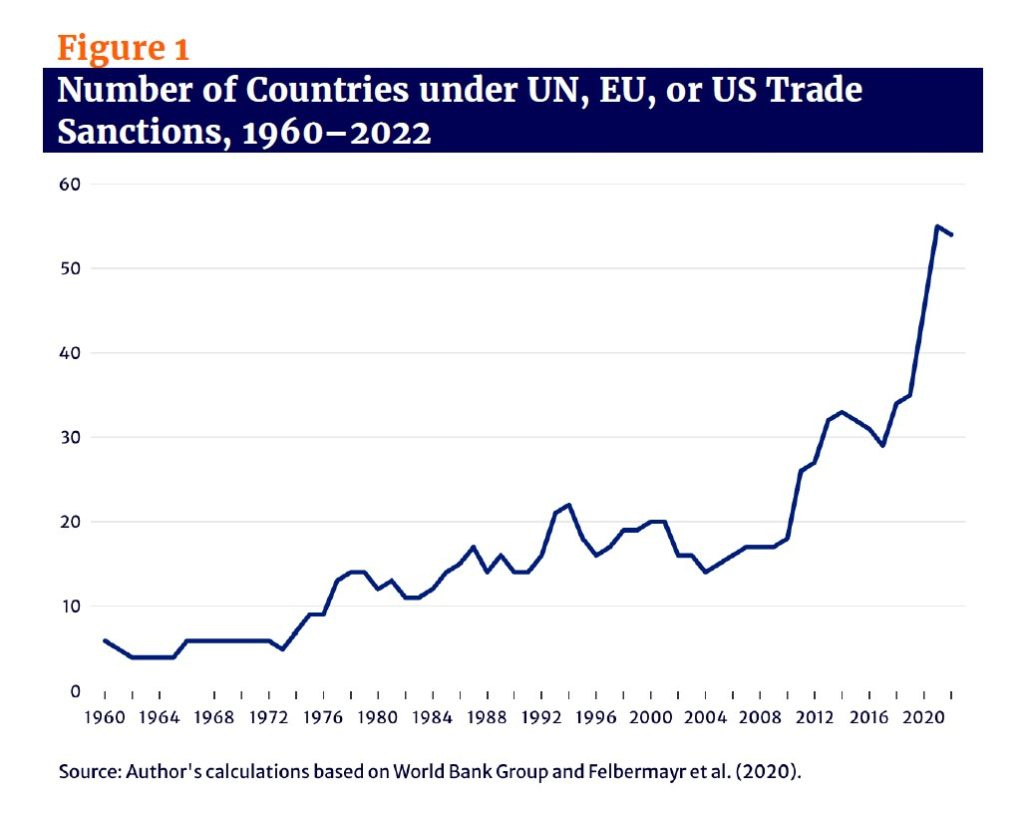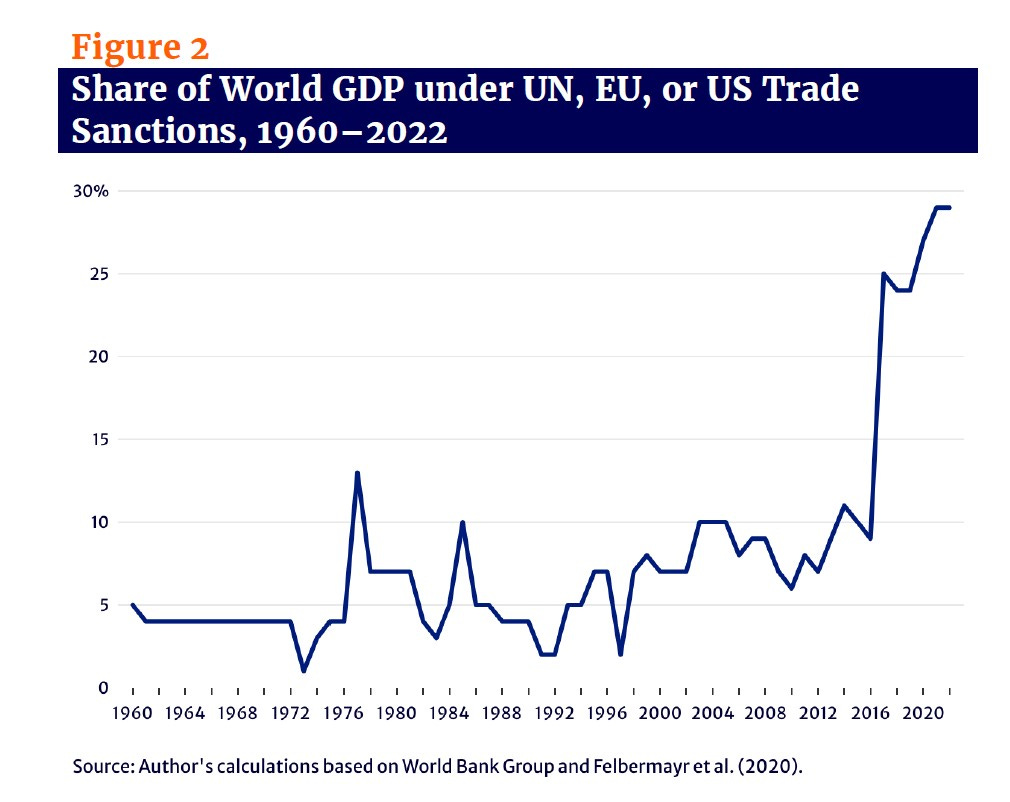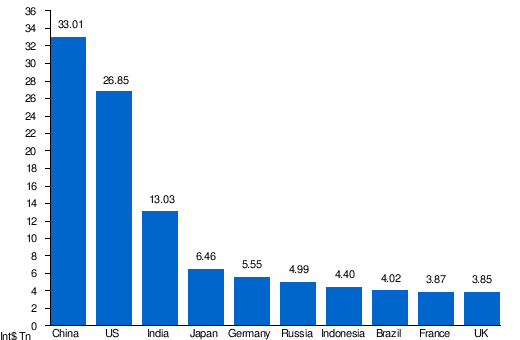Western sanctions failing: EU imports more Russian gas, China beats US tech war
Western sanctions are backfiring: The EU is importing Russian liquified natural gas at record levels, and China is making high-tech chips despite US export restrictions.
Western sanctions are backfiring: The European Union is now importing Russian liquified natural gas at record levels, and China has made high-tech breakthroughs despite US export restrictions.
Washington's and Brussels' economic warfare is, ironically, strengthening the economic sovereignty of Beijing and Moscow while blowing back on Europe.
The world is living through a new cold war: Cold War Two. And one of the main ways in which this war has been waged is through economic means.
Sanctions are the principal instrument of economic warfare. When they are imposed unilaterally by a country, without the support of the United Nations, they are referred to as "unilateral coercive measures" and are illegal according to international law.
One-quarter of the global population lives in countries that have been unilaterally sanctioned by the United States.
The nations sanctioned by the US and Europe represent nearly one-third of global GDP.
The application of sanctions by the United States and its European allies has skyrocketed in recent years.
Among the countries sanctioned by the United States are two of the most powerful nations on Earth: China and Russia.
China has the world's largest economy, when you measure its GDP at purchasing power parity (PPP). Russia has the sixth-biggest economy on Earth.
The US government has made it clear that its goal is to sabotage the economies of these Eurasian giants.
But Washington has failed.
China continues developing state-of-the-art technology, while Russia has only further solidified its role as a global commodities powerhouse, strengthening its own manufacturing sector.
The failure, and even blowback, of this Western economic warfare shows that, while unilateral sanctions can do, and often do, significant damage to smaller countries with less developed economies, like Venezuela, Cuba, or Syria; for big nations with a massive industrial base, like China and Russia, their economies may effectively be "too big to sanction".
In these cases, Western sanctions do economic damage in the short term, but in the medium to the long term, the unilateral coercive measures actually help the targets by making them more economically and technologically sovereign.
These huge Eurasian economies find alternatives and are no longer dependent on Western corporations; they develop their own high-tech manufacturing sectors, with more value added in the production process.
China advances technologically despite US sanctions
In 2021, US President Joe Biden insisted he must prevent China from becoming "the leading country in the world, the wealthiest country in the world, and the most powerful country in the world; that's not gonna happen on my watch".
Similarly, US Commerce Secretary Gina Raimondo said that Washington's goal is to "slow down China's rate of innovation”.
In order to damage China's economy, and particularly its tech sector, the United States has imposed many rounds of aggressive sanctions, starting first under President Donald Trump and very much continuing under Joe Biden, in a thoroughly bipartisan campaign.
However, these sanctions have failed to prevent China from technologically developing; Beijing has continued taking huge strides.
The Chinese firm Huawei has developed phones with advanced chip technology. The company's Mate 60 Pro model entered the market this September, and took the world by storm.
Bloomberg revealed that the Mate 60 Pro is Huawei's first phone to use the most advanced technology produced by Beijing's state-owned Semiconductor Manufacturing International Corporation (SMIC), a Kirin 9000s chip with a 7 nanometer processor.
"Beijing is making early progress in a nationwide push to circumvent US efforts to contain its ascent", the media outlet stated.
Both SMIC and Huawei have been sanctioned by the US government.
The Washington Post similarly acknowledged that "the Mate 60 Pro represents a new high-water mark in China’s technological capabilities, with an advanced chip inside that was both designed and manufactured in China despite onerous U.S. export controls intended to prevent China from making this technical jump".
The newspaper added that the phone's "launch has sparked hushed concern in Washington that U.S. sanctions have failed to prevent China from making a key technological advance. Such a development would seem to fulfill warnings from U.S. chipmakers that sanctions wouldn’t stop China, but would spur it to redouble efforts to build alternatives to U.S. technology".
Huawei revealed the new phone when US Commerce Secretary Raimondo was visiting - a clear message of defiance against her office's campaign of economic warfare.
Europe imports record levels of Russian liquified natural gas, despite sanctions
Russia is one of the most sanctioned countries on Earth. The United States and European Union have imposed many rounds of sanctions on the Eurasian nation over the NATO proxy war in Ukraine.
President Biden made it clear that Washington's goal with this economic warfare was to turn Russia's currency, the ruble, into "rubble".
Biden boasted in March 2022 that one ruble was, at least briefly, worth less than one US penny.
We are enforcing the most significant package of economic sanctions in history, and it’s causing significant damage to Russia’s economy.
It has caused the Russian economy to, quite frankly, crater.
The Russian ruble is now down by 50 percent since Putin announced his war. One ruble is now worth less than one American penny. One ruble is less than one American penny.
And [we are] preventing Russia’s central bank from propping up the ruble and to keep its value up. They’re not going to be able to do that now.
We cut Russia’s largest banks from the international financial system, and it’s crippled their ability to do business with the rest of the world.
Biden did not mention that there are more than 140 million Russians living in Russia, and they use the ruble in their everyday life; they get paid their wages in rubles.
By trying to destroy their currency, this Western economic warfare has not only harmed the Russian government and Vladimir Putin; it has been hurting the entire country, including more than 140 million civilians.
But sanctions are not a precise instrument - despite the fact that Western governments constantly, and misleadingly, claim they are "targeted" against individuals and have supposed "humanitarian exemptions".
Sanctions are a brutal instrument of economic warfare, of collective punishment; they often do serious damage, and have major consequences for civilians living in targeted countries.
In Venezuela, for instance, mainstream experts found that at least tens of thousands, and perhaps more than 100,000, civilians have died because of the illegal, unilateral sanctions imposed on the South American nation by the United States, as part of the Donald Trump administration's coup attempt with Juan Guaidó.
In the case of Russia, however, the economic sanctions have not done as much damage as the West would have hoped.
Initially, the ruble did significantly depreciate against other currencies, but it soon rebounded, largely because of the rise in the price of oil and other commodities. Russia is one of the world's biggest producers of oil, gas, fertilizers, and wheat.
In fact, not only have the sanctions failed to turn the ruble into rubble and devastate the Russian economy; they have backfired on Europe, unleashing an energy crisis and contributing to high levels of inflation.
In the meantime, the European Union is importing record levels of Russian liquefied natural gas (LNG).
The Financial Times reported that, in the first seven months of 2023, EU members Belgium and Spain were the second- and third-largest purchasers of Russian LNG. The only other country that bought more was Russia's closest ally: China.
France and the Netherlands have also been importing significant quantities of Russian LNG.
"EU imports of the super-chilled gas were up 40 per cent between January and July this year compared with the same period in 2021", the Financial Times wrote.
The newspaper added that "the EU did not import significant amounts of LNG before the war in Ukraine due to its reliance on piped gas from Russia".
What happened to that pipeline gas? Well, Europe pledged to boycott it. But furthermore, some of the most important pipelines connecting Russia to Germany, Nord Stream, were blown up in an international act of terrorism in September 2022.
Who exactly sabotaged this crucial energy infrastructure is not known. But Pulitzer Pitzer-winning journalist Seymour Hersh reported that it was the US government.
So now EU member states are importing Russian LNG at record levels. And ironically, they are paying even more than they had before for the cheap pipeline gas.
The Financial Times reported that Europe has spent roughly €5.29 billion buying Russian LNG on the spot market from January to July 2023.
The newspaper noted, "EU officials have pointed to an overall effort to phase out Russian fossil fuels by 2027, but warned that an outright ban on LNG imports risked prompting an energy crisis akin to last year when EU gas prices hit record highs of more than €300 per megawatt hour".
Russia is now the second-largest exporter of LNG to the Eurozone. The only country that sells more is the United States.
In fact, due to the energy crisis in Europe and sanctions on Russia, in 2022, the United States became the largest exporter of liquefied natural gas in the world (tied with Qatar).
So while Europe's economies suffer, US corporations are benefiting.
At the same time, Western ally India has been buying record amounts of Russian oil, below market value, at a neat discount, then refining that crude and selling it to Europe with a fat markup.
So India is handsomely profiting from selling Russian oil to Europe, because Europe refuses to buy the Russian crude directly due to its sanctions.
This suicidal sanctions policy has fueled an energy crisis in Europe, pushing economies into recession and causing de-industrialization at breakneck speed.
Average working people have shouldered the burden of this economic pain.
The real wages of workers in the Eurozone fell by 6.5% from 2020 until 2022.







Please quit equivocating over who blew up Nordstream pipelines, it is as plain as day the US blew them up and then gloated about it publically.
Thanks Ben for the brilliant clarity you bring to the issues.
It is so tragic the US only sees the world in terms of warfare and conflict when they should be building building back better just like the Russians and Chinese . They fail to see endless conflict only weakens their best interests,, delays the day when they have to start re-inventing themselves, and refusing to accept the reality these two countries cannot be pushed out of existence like a couple of banana republics.
It is equally sorrowful the world community at large does not speak out with a stronger voice and make it clear it will not be held hostage to America's despotism.
As your video makes so we explicitly clear the whole world community is paying a horrendous price for America's egregious despotism at a time. ALL of us are facing daunting challenges on so many other global issues .
It appears Washington is playing the same old filthy game-- using warfare to distract from the critical issues at home it should be addressing-- and the failure to do only accelerates its decline.